
3/24/2020 - (Book) Love in
the Time of Coronavirus

The past week has been filled with suggestions from the
media on how to fill this sudden free time a lot of us now have under
our new reality of Social Distancing. I’ve seen news programs
suggest things like old movies, impromptu puppet shows, board games,
and . . . animal husbandry. One suggestion I heard came from a news
anchor who blithely said, “Why not read a book?” I looked
up at the television and smiled. Already there.
I have too many books. This is what I’m told. But between you
and me, those people don’t know what they are talking about. Sure,
every time I’ve asked friends to help me with a move, I can see
the subtle wince they’ve made. They know what’s coming.
Dozens of boxes, full of hundreds of pounds of dead weight. Everything
from the lightest “The Zen of Zombie” to the incredibly
heavy “A History of Art.” These books have always traveled
with me, wherever I go. I’ve taken a lifetime to accumulate them,
and – like the poor, distressed people you see on “Hoarders,” when
it is suggested to me that I must throw some away, I instantly turn
on them with a frightening look that says: Who even let you into my
home?
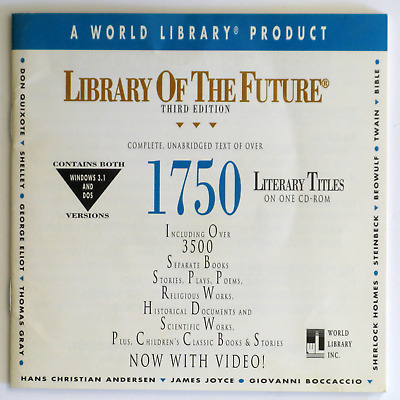 I thought I had a solution to this problem a couple of times
in my life. The first time was in 1988. I was walking past an electronics
store in downtown Manhattan when something in the window caught my eye.
It was a CD-ROM software title called “The Library of the Future” and
it boasted that its magically held – hold your breath -1,750 literary
titles. If you had seen young me standing in front of that window, mouth
agape and frozen in place, you would have asked if I was having a serious
health issue. I put some money together and came back in a week hoping
that no one else had seen this powerful artifact of the Gods. No one
had. At last, I thought, I’ll seldom have to fiddle with the inconvenience
of a physical book again! There were 700 Megabytes of information on
this one disc! How could you possibly need more information than that? I thought I had a solution to this problem a couple of times
in my life. The first time was in 1988. I was walking past an electronics
store in downtown Manhattan when something in the window caught my eye.
It was a CD-ROM software title called “The Library of the Future” and
it boasted that its magically held – hold your breath -1,750 literary
titles. If you had seen young me standing in front of that window, mouth
agape and frozen in place, you would have asked if I was having a serious
health issue. I put some money together and came back in a week hoping
that no one else had seen this powerful artifact of the Gods. No one
had. At last, I thought, I’ll seldom have to fiddle with the inconvenience
of a physical book again! There were 700 Megabytes of information on
this one disc! How could you possibly need more information than that?
The years went by, and physical media exploded through the
infinite storage space of the Internet. It became possible
to find databases filled with Terrabytes of text from classic
books. Then E-Readers came
along, and this was - I thought - a second chance to stop my
addiction. I bought my first Kindle and put it on my shelf
with all the reverence of a treasured relative’s
urn. Here was truly a magnificent device, I thought. A way
to magically transmit modern books through
the airwaves and into my brain. Nothing could be more inspiring
than that.
And yet, throughout this digital revolution, I was living a
lie. I still bought physical books whenever I could. I never
stopped. It became a double anachronism among many of the people
I knew. First, they said, why
are you still reading in this age of mass media? And secondly, why
are you reading an actual book?
What I’ve come to realize is that the act of holding a physical
book, turning its fragile pages, holding some soft leather-bound cover,
inhaling the scent of paper that has not seen daylight in years, is
more than just reading. It’s ritual. It’s something that
ties us to those long-ago sages who were as addicted to the act of reading
as we are. There is a comfort in it for us. And when I see futuristic
television shows or movies that show characters in this same act, it
makes me believe that it will continue long after I am gone. And that
is comforting as well.
That’s what we need during this scary time, isn’t it? A
sense of connection to the past, and a hope for the future. Books give
us that. And when I am settling into a quiet night illuminated by the
Netflix-provided Fireplace For Your Home, and dulcet tones of my robotic
Amazon Echo, you can bet that it’s a real book I’ll be holding.

3/15/2020
- Top Five Movies to Watch as Society Collapses
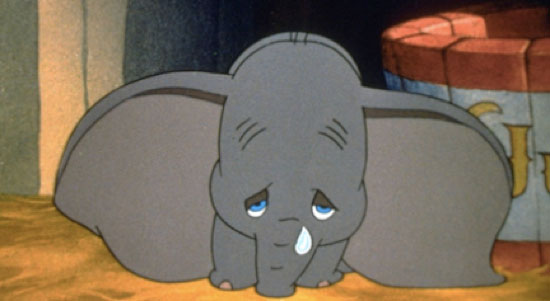
It’s a tough time for all of us. Every day brings
new restrictions and closures as the Coronavirus continues its unchecked
spread. We’ve all become isolated under this new normal. Here’s
five movies to help you deal with the situation:
1) The Last Man on Earth - Vincent Price stars as the titular hero
in a world ravaged by undead vampire thingies. The instructive part
about this movie is how mundane Mr. Price makes the End of the World
seem. It wouldn’t be so bad, he thinks, if it wasn’t for
all these little details to attend to. He wakes up, has his coffee,
and starts to bemoan the number of creatures he must kill that day.
Ugh. So many murders, so little time. Then he’s forced to drive
all the way out to the dump for christsake and burn all the bodies.
Gonna need a gas stop for that. And these creatures, with their incessant
moaning and clawing at the outside of his house. That’s gonna
be another trip to the hardware store. And omg now he has to make even
MORE stakes. It’s enough to drive a man to drink, all these little
inconveniences about everyone in the world being dead but him. Le sigh.
2) Night of the Living Dead (1968) – In which mindless, hungry
hordes roam the land, with neither emotion nor intellect, driven by
a ceaseless and brutal need to feed themselves repeatedly, until the
world entire is emptied of life. That was the grocery store the other
night. The movie is pretty good.
3) The Thing (1982) – Trapped in an underground bunker, a small
group of men fight for survival as suspicion and fear slowly begin to
overtake reason. Chaos and murder soon follow as distrust is sown and
people are revealed for their true colors. If you think this scenario
is far-fetched, wait until the kids have been home a week and the cereal
is all gone.
4) The Black Death – Sean Bean stars in a film set in a plague-ridden
14th century, where superstition and ignorance hinder efforts to get
to the truth during a time of sickness and panic. Not at all like today’s
modern world.
5) Bambi – because things were getting a little
dark here, you know what I’m saying? Just sit back and watch a
movie about animated forest creatures who prance through the
greenery and then watch as some
of them . . . die . . in . . . a . . . fire. Scratch this one – watch “Dumbo” instead
and see . . . a baby elephant cry his eyes out after being
torn from mommy. Never mind that one. See “Snow
White” instead, and
watch . . . as a jealous boomer poisons a beautiful girl for
the crime of
looking good. Walt Disney, who hurt you?

3/13/2020 - The
Coronavirus Chronicles – Day
One The call came in at 2:20 p.m. yesterday. My son’s
school will be closed for the next two weeks due to concerns over the
spread of the Coronavirus. Two hours later, my fiancé’s
work called and said that for the next two weeks, she can work from
home, and my office is my upstairs bedroom. All retail stores are being
asked to close for this duration. Non-essential travel is being discouraged.
There is now the possibility that the three of us will be trapped in
this house for many days.
This is a situation I have dreamed of.
Now before I get nasty emails about how the Coronavirus is
nothing to be happy about, let me explain that I understand
the reason for concern. We as yet have no vaccine for the virus,
and many people
are at risk. The panic caused by the virus is also equally
alarming. Yesterday I saw lines at the grocery store that looked
like they were
for free trips to the Caribbean. People are genuinely scared.
But the result of this panic is that we will all be inside
the house for approximately two weeks. And that, my friends,
is my bread and butter. It essentially turns this suburban
house into a cabin the
woods during a two-week writer’s retreat, and what could be more
perfect than that? I crave solitude. It’s the chance to think,
work out imaginary scenarios for plotting, think up details for characters’ backstories,
and most of all, read. “There’s time now,” says Henry
Bemis in the famous Twilight Zone episode. “Time enough at last.”
There’s also the fact that one of my favorite reading genres is
post-apocalyptic fiction. Everything from “I Am Legend” by
Richard Matheson to novels set in the “Walking Dead” universe
fascinate me. What happens when the lights go out, these works ask.
It’s a question about human behavior that I’ve always wondered
about. The current situation is nowhere near something as dramatic as
anything in those stories. Nevertheless, it does give you a glimpse
of what such worlds would be like. To me, it’s frightening and
fascinating.
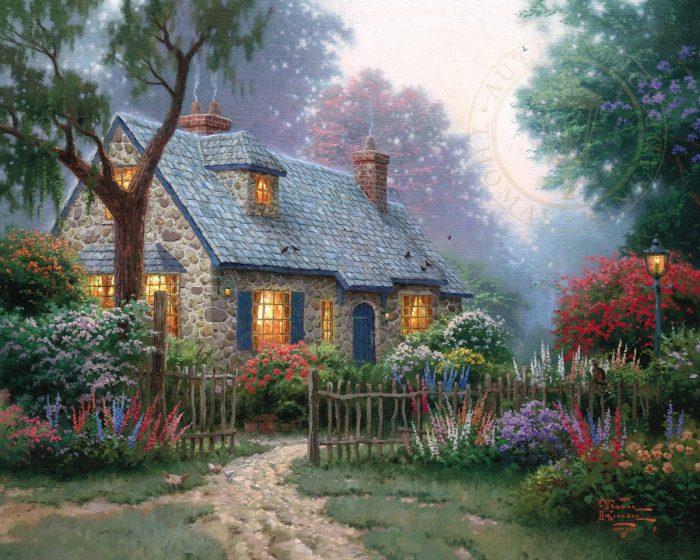 I’ve become a homebody in recent years. When I was younger, I
did a fair amount of traveling. I’ve been to Rome, Florence, Venice,
Paris, and many cities across the U.S. Those were fun, exciting trips.
But each year that has passed since, my fondness for the simple pleasures
of simply being in this house has grown. My Friday nights are happily
spent on the couch, with sounds sometimes no louder than the ticking
of the wall clock or my cat’s purring. I love it. Dorothy was
right. There’s no place like home. I’ve become a homebody in recent years. When I was younger, I
did a fair amount of traveling. I’ve been to Rome, Florence, Venice,
Paris, and many cities across the U.S. Those were fun, exciting trips.
But each year that has passed since, my fondness for the simple pleasures
of simply being in this house has grown. My Friday nights are happily
spent on the couch, with sounds sometimes no louder than the ticking
of the wall clock or my cat’s purring. I love it. Dorothy was
right. There’s no place like home.
This Coronavirus crisis will pass eventually. We’ll all go out
and get right back to the things we love. But for this all-too-brief
moment, I’m taking time to appreciate the comforts of the hearth.

3/9/2020 - The Double-Space
Problem and the End of the World
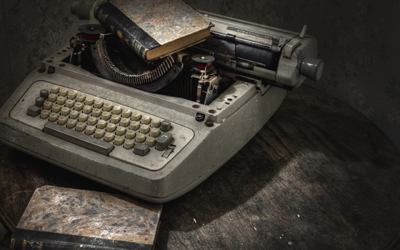 Every writer of a certain age has, at one point or another,
had a dark night of the soul and questioned everything they know about
their world when they encounter the Double-Space Problem. To wit: Should
every sentence be followed by one extra blank space before the next
sentence starts? Every writer of a certain age has, at one point or another,
had a dark night of the soul and questioned everything they know about
their world when they encounter the Double-Space Problem. To wit: Should
every sentence be followed by one extra blank space before the next
sentence starts?
“
Of course it should!” say the Old Guard. “That’s how
we were taught! The law is immutable!” we yell as we rattle our
walkers in anger. And in a way, we’re right. That’s exactly
what we were taught. Alongside such maxims as the proper use for a semi-colon
and the rules for enclosed punctuation with quotations, next to the
towering bronze statue of William Strunk Jr. was the equally monolithic
rule – always put two spaces after a sentence. Period. It was
always thus, and thus is shall forever be.
Except for one event that changed everything: The death of
the typewriter.
Let’s back up a bit. For decades before the typewriter existed,
typography consisted mostly of proportional fonts. Proportional fonts
each take up space relative to their character (i.e. an “W” takes
up more space than an “i” in relative terms). When typewriters
were introduced, however, fonts became Monospaced – the “W’s” now
took up exactly the same space as the “i’s” because
that’s the way the typewriter was constructed. Because of that,
sometimes fonts seem to run into each other. It was because
of that spacing that things went off the rails. To avoid any confusion,
a double-space
was now recommended between sentences.
And then in the 70’s, typewriters died. In the advent of computer
word processing, no one really mourned too hard. Proportional
fonts became the order of the day (with rare exceptions like Courier,
which
hangs onto dear life like Clint Eastwood trying to get just
one more movie with a conservative bent made), and there was no need
for anyone
to ever put a double space after a sentence again.
But it was too late. It seemed no one outside of typography
got the memo. Our teachers taught the rule as Golden. “Experts” insisted
upon it. Our own bodies betrayed us as muscle memory forced us to hit
that space bar twice after every damn period. There was no escape. In
this blog alone I’ve probably done it 20 times. I am, like so
many of us, doomed to repeat my mistake until my last day.
And so, humanity stumbles on as with so many other things,
knowing better, and yet fated to continue doing it wrong,
right up until the nuclear missiles pass each other in the sky and
give us one, last
accidental fireworks show for the ages.
Teach the children to do better. Break the chain.

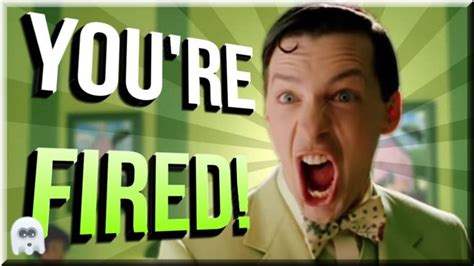
2/28/2020 I almost fired myself today.
Today was the third time this week I was late for work.
I can’t blame today on waking up late – Alexa woke me up
promptly at 6 in the morning and I didn’t even ask her for one
Snooze. I can’t blame it on the commute – the distance from
my home to my workplace is one flight of stairs. I had my reasons, but
my boss – in this case myself - wasn’t buying it.
I tried to avoid my boss when I got upstairs to the office
- I even shut the door behind me - but as always, he knew
exactly where to find me.
“
So, Jim,” He always calls me Jim when there’s a problem. “I
see this is the third time this week you’ve been late.”
“
Yes James,” I said, avoiding his eyes.
“
Care to explain?” He had an annoying habit of asking irrelevant
questions.
“
Well,” I said. “Monday I had to go the Doctor’s
office-”
“
For an appointment that happened at 10 a.m. and lasted only
20 minutes,” he finished.
“
Uh, yeah,” I replied. “And then yesterday I had to wait
for the generator guy at the house and then go get a marriage
license-”
“
All of which was done by 1 p.m.” he said. How did this sonofabitch
know so much about me?
“
Right,” I said. “Then this morning, I thought that before
I sat down to write, I would do some research for the zombie
short story I am working on-”
“
By watching Day of the Dead for the 55th time?” I could tell
he was angry.
“
Well that’s just not gonna cut it around here,” he said. “We
need you to be an efficient worker. That short story is due in by Sunday
and – are you even listening to me?”
“
I’m sorry. I’m writing a blog about all this.”
“
A Blog?” He raised an eyebrow. "That's just a delaying
tactic! We have real work to do!" And then a pause. “Am
I in it?”
“ Yes”
“ How do I come off?”
“
Not very well I’m afraid.” That really did it. His nostrils
flared. “Well you better have that short story done by today or
that’s it.”
“
I will,” I said. “If I don’t have to go to the Poconos
this afternoon.”
He looked at me in shock for a moment, and then walked away.
I think I’ll be okay. He’s incredibly understanding.

2/3/2020 Three Reasons
Zombies Won’t
Die
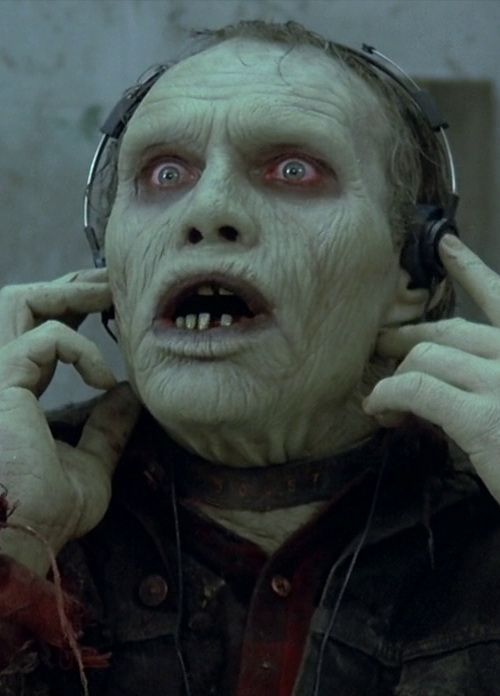 After a brief recent hospital stay, my thoughts started to drift toward
the topic of zombies. The first reason was practical – there is
a looming deadline for a zombie short story submission coming up, and
my progress on it has been as slow and sluggish as the walk of the undead.
The second reason led me to more existential thoughts. After all this
time in the public consciousness, why haven’t zombies faded from
our daily pop culture? You’d think we’d be sick of them
by now. But with Zack Synder’s upcoming “Army of the Dead” movie,
and with the Walking Dead adding a third series to its television universe
soon, you have to wonder if zombies will ever leave our thoughts. I
think there’s three reasons the zombie story has staying power: After a brief recent hospital stay, my thoughts started to drift toward
the topic of zombies. The first reason was practical – there is
a looming deadline for a zombie short story submission coming up, and
my progress on it has been as slow and sluggish as the walk of the undead.
The second reason led me to more existential thoughts. After all this
time in the public consciousness, why haven’t zombies faded from
our daily pop culture? You’d think we’d be sick of them
by now. But with Zack Synder’s upcoming “Army of the Dead” movie,
and with the Walking Dead adding a third series to its television universe
soon, you have to wonder if zombies will ever leave our thoughts. I
think there’s three reasons the zombie story has staying power:
Uncertain Times
We we are living in an age of uncertainty. With the Doomsday
Clock recently being moved to a mere two minutes to midnight,
it’s
not hard to see why. Climate change, political upheaval,
uncurable viruses, and a world always seemingly on the brink of war
would suggest to many
people that the End is indeed upon us. Our media floods us
with this info 24 hours a day, 7 days a week. Given the climate, it’s
easy to imagine what little of a push it would take for civilization
to topple
in as few as a week. This is exactly the world depicted in
a zombie apocalypse, a world where the structure of society has broken
down.
We all take it for granted that the stores will stay open,
the lights will remain on, and the government will continue to function.
But what
if they didn’t? The world without those things is part of the
terror of the zombie story.
Immortality as a curse
Many people, when asked what they would do with a magical
wish, will immediately come back with “I want to live forever!” It’s
a seemingly pleasant thought, to pass through the ages unhindered by
death or sickness, to know that you will see all of history unfold as
you get answers to questions you couldn’t possibly have gotten
any other way.
But a deeper look at immortality reveals some serious flaws,
and some of them are horrifying. There is the issue of the
decay of the body. We are meant for a finite time on earth,
and the body knows
this and acts accordingly. Our organs fail, or skin shrivels,
our brain starts to misfire. The thought is disconcerting,
to say the least. We
watched in horror as Jeff Goldblum fell apart (literally)
in 1986’s
The Fly. Zombies are almost always depicted as missing something,
usually as a result of the trauma that caused them to die.
There is also the loss of friends and family, the fact that
as we get older, life seems to take away more from us than
it gives us. The character of Connor McCloud deals with this
heavily in the Highlander
movies. He lives, while everyone else around him slowly dies.
There are many vampire stories that deal with this issue
as well.
I think we all say we want to live forever, but secretly
dread the actual prospect. That mixture of fascination and
dread is what keeps
us hooked on the zombie genre.
The Zombies Are Us
Zombies don’t come at you dressed in spacesuits or look like creatures
from another world. The typical zombie may be wearing a tuxedo, or a
nurse’s uniform, or may be dressed as a police officer. In the
worst scenarios, the zombie will appear as someone we knew
and loved, a dear friend or a family member. That is the
true horror of the zombie
story. Anyone can turn against you.
This was baked in right at the beginning of the modern zombie
myth by George Romero, who directed the classic “Of the Dead” film
series. One need only think of Romero’s zombies shuffling through
the mall in “Dawn of the Dead,” still trying to shop, or
the zombies in “Land of the Dead,” running about their daily
routines, filling gas, striking up a terrible band, and walking the
streets holding hands. Were it not for the ceaseless need to devour
human flesh, the zombies would act in ways that approximate regular
human behavior so well that we might not recognize them as the undead
at first. In fact, the film “Shaun of the Dead” perfectly
captures this by showing the main character walking to the
store before the zombie outbreak, and then a day later walking
to the store again,
with very little noticeable difference in the behavior of
the people in the streets.
Zombies are ruthless killers because they are a hoard that
acts without empathy or mercy. They are coming to get what
they need, and they have no concern for who gets in their
way. You might be forgiven
for looking around at today’s world and wondering what the huge
difference is between their world and ours. Therein lies
the horror. We are almost in a state of zombie apocalypse already.

1/13/20 - The End (Should
Be) Nigh
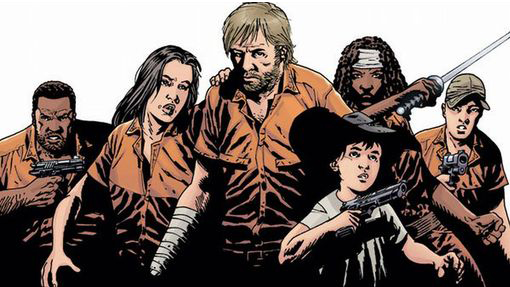
I recently picked up a copy of The Walking Dead Compendium
Four. This massive book contains the end of the story for Rick, Michonne,
Carl and others from the Graphic Novel series. Since their destinies
are unchained from the versions of their characters on the television
show, I was very curious to see how things ended up for them all. But
I was more curious to see how the creator of the series, Robert Kirkman,
felt about the end of his long-running story.
I jumped ahead to the very end of the book to read his
farewell notes on the series and discovered something that
I intuitively knew
all along: Kirkman intended to end the Walking Dead long
ago. How long ago? The story he had in his head ended after
Rick and the other survivors
settled Alexandria, which in the television series lines
up with about the middle of Season 6. According to Kirkman,
Rick would have given
a great speech, and the “camera” would have pulled out
and slowly shown his face on a statue which was overgrown
with moss as the
dead shambled through the empty streets of Alexandria. It
was the bleakest ending possible. In other words, it was
the perfect Walking Dead ending.
He nixed it, however, because he couldn’t let go of the franchise.
He believes he made the right decision because had the story
ended in Alexandria, there would be no All-Out War with Negan,
no Whisperers,
and many characters who appeared later in the story would
not have existed.
Kirkman, as the creator of this world, is free to do whatever
he sees fit with it. Yet I feel that his original instinct was correct.
The ending he would have originally set would have fit in thematically
with the story he was telling. It would have been a great George Romero-style
ending, and Kirkman has nothing but admiration for Romero. It would
have been the ending that the story demanded in fact.
There have been many epic sagas wrapping up lately, with mixed
results. The Game of Thrones controversy still stings for a lot of people
and the Skywalker Saga just ended on an interesting note. Fans may have
felt cheated when they found the endings not to be to their liking,
and there are some fair criticisms. We invest so much time in these
stories that we want the result to be perfect.
All of this illustrates how hard it is to craft a great ending
as a writer. The ending of a story must be satisfying, entertaining,
and enlightening – all at the same time. I think one of the
chief threats to a good story is staying too long in the
world. A good story
should leave the reader wanting more. The End gives everything
that came before it meaning and makes the journey worth it.
“
The Roleplayers” is intended to be a trilogy. Period. I have
everything in mind about what I must do, and I know the exact
ending already. Details
may change, of course, but Book Three is the Final Book.
Unless, years later, my budding writer son wants to continue
it. Then I say have at it!

12/21/19 The End of Skywalker
or: How I Learned to Stop Worrying and Love the Saga

I’ve just returned from the latest episode of Star Wars. The ninth
film in the Skywalker Saga (not including the offshoot movies “Roque
One” and “Solo”) has arrived and I have … feelings.
To say that this latest film had a lot to live up to is like
saying Everest is kinda big. Over four decades of fan investment
was on the line, and JJ Abrams must have had Rancor-like
shoulders for Disney
to put this on him. And you know what? It worked. Abrams
delivered a truly entertaining film, full of humor, action,
surprises,
and genuine
emotion.
It was a good time at the movies.
Still. Something was missing. And that something was George
Lucas himself.
Lucas had a specific intention when he still owned Star Wars.
He wanted to clothe old stories in new dressings, taking
mythology out of the dreary past and putting in spaceships
fighting desperate
battles
over exotic planets. He was keenly aware that the main point
of watching Star Wars was to learn lessons from the past,
universal truths about Good
and Evil, about Destiny, and about all the things more suited
to Bulfinch’s
Mythology than a modern movie. Despite all the mythological
pretensions, It worked. The films' spirituality spoke to
an entire generation. From the original
trilogy, through the prequel trilogy, and the excellent Clone
Wars cartoon, his vision was stamped on everything.
Disney’s vision is different. They want to entertain more than teach.
And there’s nothing wrong with that. This new sequel trilogy has
been very engaging, and Rise of Skywalker is the best of batch. Now fully
reunited, the three main characters – Rey, Finn, and Poe – work
great together. One wishes that they had more time to create more of the
story together. And Adam Driver’s Kylo Ren goes through a dramatic
arc that will satisfy fans for years. “Rise” is a fitting
finish to Abrams’ work on Star Wars. It has heart. It’s a
great story. It’s fun.
As I sat there in the enormous darkness of the IMAX theater
with my son and an old friend, enjoying a good ol’ time at the movies,
I slowly began to realize that even though the new Star Wars is different,
that doesn’t mean it’s less than the old Star Wars. Good Star
Wars can take many forms, and as the great Disney+ series “The Mandalorian” shows,
some of the new pathways are extremely promising. Even more
encouraging for me is the upcoming Obi Wan series, which promises
to focus on the
more spiritual elements of the Original Trilogy.
So now, I can relax and not rail so much against the ending
of the old way of doing Star Wars. The Saga is a living thing
now and it must
change and adapt for it to thrive in the future. It must
move on to wherever Disney is taking it. I’ll stay on that
ride for as long as I can.
Home

12/16/19 - Hey you – Get
a (Writing) Room!
Non-writers may sometimes get the impression that writing fiction is
a kind of mystical art, one that requires complete solitude and the
supernatural ability of the writer to commune with an unseen world.
It’s kinda true.
What fiction writers attempt to do is create a world that
does not exist and convince the reader that it is a living
milieu. The writer conjures characters, backstories, histories, and
situations to make that world as believable as possible.
The smallest details must
be invented from nothing, and all of it must be kept track
of as if it were a tangible domain. If that isn’t a kind of
magic, I don’t
know what is.
In order to fabricate this world, it helps greatly
to have a location that is sealed off from the real one,
a place where the ordinary rules don’t apply, where the imagination
is free to explore every possibility. That is why many well-known
authors recommend
having a space set aside to perform such works of wonder,
a room where the possibilities are endless.
The size of the room, its location, and its contents are
of little importance in its purpose. What is of vital significance
is a door.
A door that can be shut and even locked if necessary. The
reason is simple. For the Writing Spell to work, there can
be no interference during the casting. This is serious work
here.
A writer is
conjuring
demons out of thin air. Or accountants. The connection between
the writer and the world being created word by word must
be unbroken.
In his mighty work “On Writing,” Stephen King describes
just how vital it is to have such a portal:
“…one of the most important parts of your writing space
is the door. That’s right, your room must have a door that you’re
willing to shut and keep closed until you’ve reached your daily
writing goal. It also tells people that you mean business. By closing
the door, you’re saying to the world to stay out, that important
stuff is going on behind it. He says the door not only serves to keep
the world out, but it also serves to keep you in and focused, without
having to look to see who may be passing by the entryway.”
 My own Writing Room is the highest room in the house. It is only reachable
by a single flight of stairs, which can be conveniently destroyed in
the event of a zombie apocalypse, cutting off all access. It’s
a small space, 16x20 feet. This is where I keep all my reference books
and the books on writing I’ve collected over the years. It took
a while to get it right, but it really is my Fortress of Solitude. During
National Writing Month, it served as the perfect location to bang out
50,000 words in 30 days without much distraction.
My own Writing Room is the highest room in the house. It is only reachable
by a single flight of stairs, which can be conveniently destroyed in
the event of a zombie apocalypse, cutting off all access. It’s
a small space, 16x20 feet. This is where I keep all my reference books
and the books on writing I’ve collected over the years. It took
a while to get it right, but it really is my Fortress of Solitude. During
National Writing Month, it served as the perfect location to bang out
50,000 words in 30 days without much distraction.
The size and contents of such a room can vary wildly. Some
writers have a shed all their own to do the work in. Others
find it useful to hunker down in a basement. Some even retreat
not just to their garage, but to the confines of their
car to ensure solitude. I’ve
heard a surprising number of accounts by writers who have
claimed the lavatory as their own Crucible of Enlightenment,
attempting to steal an hour
or two away from the daily claims on their attention. Whatever
works.
So if you write, find that space and make it your own. Use
it as a place of creative incubation and let the words flow.
Home

12/12/19 - Grimtooth’s
Traps – Evil
at its finest.
Near the end of The Roleplayers, our heroes discover to their
abject horror that their Game Master has injected a little
something special
into the dungeon they are trying to navigate: Traps from Grimtooth.
The characters sigh in exasperation. They know their gooses
are not just cooked but flambéed.
Grimtooth’s Traps was a series of roleplaying supplement books
put out by a company called Flying Buffalo in the 1980's. They
were meant to be used with any roleplaying
system, including D&D, Pathfinder, MERP, etc. At the height of D&D’s
popularity, there were scores of third-party supplements made for the game,
but Grimtooth set itself apart from the rest by focusing on one of the more
fun (and deadly) elements of any good adventure.
The Grimtooth series focused exclusively on providing Dungeon Masters clever
and in some cases brilliant traps designed to wipe out entire adventuring
parties. Usually in a dungeon, a trap represents an opportunity for the players
to figure
out a puzzle to avoid serious damage, like tapping on the right stone to
avoid falling into a pit. Grimtooth went past all that “serious damage” nonsense
and got right down to business. In the traps found in their books, Dungeon
Masters found a variety of ways to send their players back to the drawing
board.
Consider just one of the traps in the first book of the Grimtooth series,
The One That Got Away. The player finds his or herself before an underground
lake
within a cavern. On the shore of the lake is a chair and a fishing pole.
The lake is filled to the brim with hungry fish.
The fishing line is an elaborate spring trap. Should the unfortunate player
sit down in the chair and fish, pulling the line taut triggers the spring
trap and the player is immediately vaulted to the ceiling in an arc. If they
let
go of the line, they are impaled on the stalactites found on the cave ceiling.
If they hold the line while flying, at the end of their Journey to Death
they are smashed against the coral reef that was hidden just below the surface.
Sometimes the best detail of the trap was found in its illustration. Here’s
the one for The One That Got Away:
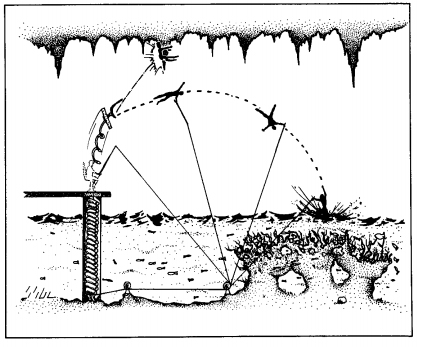
Just one more way for an evil Dungeon Master to show his players who
was boss. Grimtooth was chock full of insidious traps to play
with, and produced a whole series dedicated to new and inventive ways
to send
characters to their maker.
The best place to find Grimtooth material is at Goodman
Games.
Be warned, however. Your players will hate you for it.
Home

12/9/2019 Authors – What
an Ego!
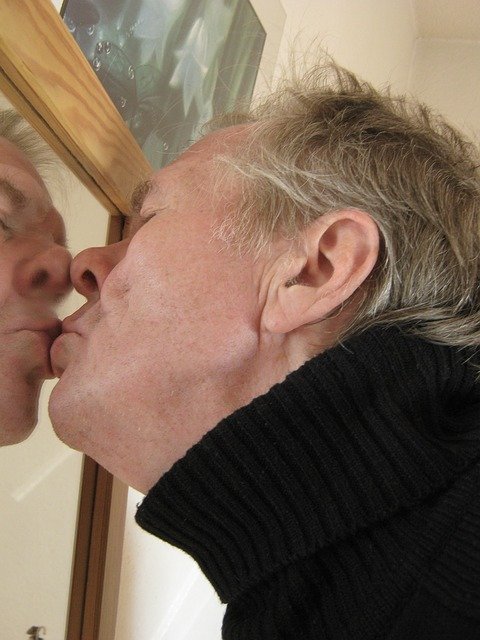 Well it seems I’ve crossed that line between Writer and Author.
Some writers don’t see it as a mere line in the sand. Oh no. For
many it’s a barbed wire fence, with landmines on either side,
and venomous snakes patrolling the perimeter. Why would you even try
to cross that? Well it seems I’ve crossed that line between Writer and Author.
Some writers don’t see it as a mere line in the sand. Oh no. For
many it’s a barbed wire fence, with landmines on either side,
and venomous snakes patrolling the perimeter. Why would you even try
to cross that?
The answer, it seems, is because you have a healthy Ego.
“
Ego” is a loaded term. When we hear it, we tend to picture some
jerk walking around the office, verbally infecting everyone
with their sense of self-importance. It’s a pro baseball player
who strikes out when he should have been looking for a walk.
It’s
all those dolts in Washington who seem to be more interested
in their own power
than the well-being of the people. Who would want to have
an Ego like that?
In truth, Ego is no more than a sense of self-esteem or self-importance.
There’s nothing negative about that. We need Ego to move forward
in life. Sometimes our Ego is what saves us from self-destruction. It’s
a healthy part of our psyche that has been embedded in us
since caveman times.
Given that, Authors need a healthy ego to thrive. Think about
the difference between a Writer and an Author. A writer could
be technically brilliant, blessed with the ability to make
a reader cry or cheer or
think about a topic in a way they never have before. A writer’s
words could flow unto the page with a lyricism that should be studied
by critics. But then there’s that little trick called “Showing
our work to others.” And not just a handful of people. Showing
it to the World. Capital “W.”
That’s a different mindset from enjoying the pure act of creation
on paper. It requires a writer to believe that there are
not only other people interested in reading what they have created,
but that there
are a ton of other people interested and waiting to read
it. The Ego of that Writer!
The truth is, all you have do is believe that you’ve created something
that you’d like to read. That’s it. Because in the end,
you are not as unique as you believe you are. The world is
a big place. Surely there are others out there who not only would
be interested in
what you wrote, but they would love how you wrote it.
Write for an audience of One and trust your Ego enough to
believe that there are others out there who would appreciate
what you’ve
done.

|

